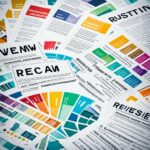Are you passionate about writing and making a positive impact in your community? If so, becoming a part-time grant writer for nonprofits might be the perfect career path for you. In this guide, I will walk you through the steps to become a successful part-time grant writer, from understanding the role to gaining relevant experience and developing essential skills. Whether you’re looking for part-time grant writing jobs or interested in freelance opportunities, this article will provide you with the knowledge and resources to kickstart your grant writing career.
Key Takeaways:
- Part-time grant writing offers a flexible career path for individuals interested in writing and making a positive impact in their community.
- Understanding the role of a grant writer is crucial, as they are responsible for writing proposals to secure funding for non-profit organizations, educational institutions, and government agencies.
- Developing essential skills such as research and analysis, effective writing techniques, and communication and networking is vital for success as a grant writer.
- Gaining relevant experience through volunteering, part-time positions, or freelancing can help you build your portfolio and enhance your skills in grant writing.
- Building a professional profile, acquiring formal education and training, and joining grant writing associations are important steps to become a successful grant writer.
Understanding the Role of a Grant Writer
A grant writer plays a vital role in securing funding for non-profit organizations, educational institutions, and government agencies. As a grant writer, I am responsible for crafting compelling proposals that effectively communicate the client’s mission and goals, aiming to secure financial support.
To fulfill this role successfully, a grant writer needs to have a strong understanding of the grant writing process, excellent research and analytical skills, and the ability to write persuasively. Through meticulous research and analysis, I identify suitable funding opportunities and tailor proposals to match the specific requirements of each opportunity.
Grant writers also have the crucial task of building and maintaining relationships with clients and funders. This involves cultivating trust, effective communication, and providing progress updates on grant utilization. By ensuring transparency and accountability, I establish long-lasting partnerships that benefit both the organization and the funder.
Ultimately, the goal of a grant writer is to secure funding to support important projects and initiatives that positively impact communities. By leveraging my expertise in grant writing, I help organizations achieve their goals and make a difference in the world.
When it comes to grant writing, there is an array of services that I offer as a grant writer:
- Proposal Writing: I craft comprehensive and persuasive proposals that effectively communicate the organization’s mission, goals, and funding needs.
- Grant Research: I conduct thorough research to identify suitable funding opportunities and ensure alignmennt with the organization’s objectives.
- Grant Management: I manage grants by tracking progress, reporting on fund utilization, and maintaining compliance with funder requirements.
- Consulting: I provide expert guidance and advice to organizations seeking to improve their grant writing strategies and increase their chances of securing funding.
By offering these grant writing services, I help non-profit organizations and educational institutions fulfill their missions and make a positive impact on the communities they serve.
Next, let’s explore the basics of the grant writing process, including the key steps involved in crafting compelling proposals.
The Basics of Grant Writing
Grant writing is a crucial process that involves researching and identifying grant opportunities, crafting persuasive proposals, and meeting strict deadlines. As a grant writer, I understand that this process requires a combination of excellent research, writing, and communication skills to effectively convey the mission and objectives of the organization seeking funding.
One of the key aspects of grant writing is tailoring proposals to meet the specific requirements of each funding opportunity. This involves a deep understanding of the grant application process and the ability to navigate through various types of grants, including government grants, foundation grants, and corporate grants.
In order to ensure a successful grant application, it is essential to conduct thorough research to identify suitable grant opportunities that align with the organization’s goals. This involves exploring various resources such as grant databases, government websites, and private foundations to find potential funding sources.
Once the grant opportunities have been identified, the next step is to write compelling proposals that clearly outline the organization’s objectives, strategies, and anticipated outcomes. This requires the use of persuasive language, strong storytelling, and evidence-based arguments to convince the grant funders of the project’s value and potential impact.
“Grant writing is a delicate balance between showcasing the organization’s needs and demonstrating how the proposed project will address those needs.”
It is important for grant writers to effectively communicate the goals, objectives, and anticipated outcomes of the project in a concise and compelling manner. This involves providing a detailed budget, a well-defined timeline, and a clear plan for project implementation and evaluation.
The grant writing process also involves meeting strict deadlines and adhering to the specific requirements set by the grant funders. Grant writers must ensure that all necessary documents, including supporting materials and letters of support, are submitted on time and in the requested format.
Types of Grants and Funding Opportunities
The grant writing process encompasses a wide range of grants and funding opportunities. Here are some examples:
- Government grants: These grants are provided by federal, state, or local government agencies to support various projects and initiatives.
- Foundation grants: These grants are awarded by private foundations and organizations that have specific areas of interest or focus.
- Corporate grants: These grants are offered by businesses and corporations as part of their corporate social responsibility initiatives.
Each type of grant has its own specific application process and requirements, and grant writers need to be familiar with these variations in order to effectively tailor their proposals.
As a grant writer, I understand the importance of navigating the grant writing process with precision and attention to detail. By conducting thorough research, crafting compelling proposals, and tailoring them to meet the specific requirements of each opportunity, I strive to secure the funding needed to support important projects and initiatives.
Developing Essential Skills
As a grant writer, developing essential skills is crucial for success in the field. These skills encompass research and analysis, effective writing techniques, and communication and networking.
Research and Analysis
To write compelling grant proposals, a grant writer must have the ability to conduct in-depth research and analysis. This involves gathering relevant information, identifying funding opportunities, and understanding the needs and goals of the nonprofit organization or project.
“Research is the foundation of effective grant writing. It allows me to identify potential funders, understand their priorities, and tailor my proposals to meet their requirements.” – Jane Anderson, Experienced Grant Writer
Effective Writing Techniques
Grant writing requires the mastery of effective writing techniques to create persuasive and compelling proposals. Grant writers must be able to clearly articulate the organization’s mission and goals, highlight its impact, and present a strong case for funding.
“As a grant writer, my goal is to captivate the reader and clearly demonstrate the value and potential of the project. I employ persuasive language, concise storytelling, and a compelling narrative structure to engage funders.” – Michael Campbell, Professional Grant Writer
Communication and Networking
Communication and networking play a vital role in a grant writer’s success. Grant writers should have excellent interpersonal skills and the ability to build relationships with potential clients, collaborators, and funders. Strong communication allows for effective collaboration and understanding of stakeholder needs.
“Networking is more than just exchanging business cards. It is about building meaningful connections and nurturing relationships with those who can support and contribute to your grant writing endeavors.” – Sarah Johnson, Successful Grant Writer
“I have found that attending industry conferences, joining professional associations, and actively engaging on social media platforms like LinkedIn have been effective strategies for expanding my network and finding new grant opportunities.” – David Rodriguez, Grant Writing Consultant
| Skills | Description |
|---|---|
| Research and Analysis | The ability to conduct thorough research, analyze data, and identify suitable funding opportunities. |
| Effective Writing Techniques | Mastery of persuasive writing techniques, storytelling, and the ability to clearly articulate the organization’s mission and impact. |
| Communication and Networking | Strong interpersonal skills for building relationships with stakeholders, collaborating with team members, and expanding professional networks. |
Gaining Relevant Experience
As I mentioned earlier, gaining relevant experience in grant writing is essential to become a successful part-time grant writer. There are several ways you can gain hands-on experience and build your skills in this field.
Volunteer Grant Writing
One option is to volunteer your grant writing services for nonprofit organizations. Many nonprofits rely on volunteers to help them with their grant applications, and this can be a great way to gain practical experience while making a positive impact in your community. By volunteering, you’ll have the opportunity to work on real projects, collaborate with professionals in the field, and enhance your understanding of the grant writing process. Additionally, volunteering allows you to build your portfolio and showcase your skills to potential clients or employers in the future.
Part-Time Grant Writer Jobs
Another avenue to gain relevant experience is by taking on part-time grant writer jobs. These positions can be found in a variety of nonprofit organizations, educational institutions, or government agencies. Working part-time as a grant writer will allow you to immerse yourself in the day-to-day tasks of the role, such as researching grant opportunities, writing proposals, and managing grant progress. This firsthand experience will not only strengthen your grant writing skills but also provide you with valuable insight into the challenges and dynamics of the nonprofit sector.
Freelance Grant Writer
If you prefer more flexibility and diverse project opportunities, freelancing as a grant writer is an excellent option. As a freelance grant writer, you can work with multiple clients and organizations, each with unique missions and projects. This allows you to expand your knowledge and expertise in different areas and tailor your writing to various funding opportunities. Freelancing also enables you to set your own schedule and rates, providing you with more control over your career.
Remember: Gaining relevant experience in grant writing through volunteering, part-time jobs, or freelancing is crucial to advance your career in this field. It not only hones your skills but also builds your credibility and expands your professional network.
| Pros | Cons |
|---|---|
| Opportunity to make a positive impact in the community. | Not all volunteer positions offer extensive grant writing opportunities. |
| Access to professional guidance and networking opportunities. | May require a commitment of time and resources without immediate monetary compensation. |
| Building a strong portfolio of successful grant applications. | Limited availability of part-time grant writer positions. |
| Flexibility to work with diverse clients and projects. | Requires self-motivation and the ability to manage multiple clients and deadlines. |
By gaining relevant experience through volunteering, part-time jobs, or freelancing, you’ll be well-equipped with the skills, knowledge, and portfolio to take on more challenging grant writing assignments and advance your career as a part-time grant writer.
Building a Professional Profile
As a freelance grant writer, it’s crucial to build a professional profile that showcases your expertise and enhances your credibility. Craft a compelling resume that highlights your relevant education, experience, and skills in grant writing. Emphasize any certifications or specialized training you’ve completed. Be sure to include specific examples of successful grant applications you’ve worked on, showcasing your ability to secure funding for nonprofit organizations.
Alongside your resume, create a portfolio that demonstrates your grant writing skills. Include samples of successful grant proposals you’ve written, highlighting the impact they had on the organizations you worked with. This will provide potential clients with tangible evidence of your abilities as a grant writer.
Furthermore, creating an online presence is essential in today’s digital age. Build a professional website where you can showcase your resume, portfolio, and contact information. This will serve as a centralized hub where potential clients can learn more about your work and easily reach out to you. Additionally, create profiles on social media platforms like LinkedIn, which is highly regarded in the professional sphere. Connect with others in the nonprofit industry, share relevant content, and actively engage with potential clients to expand your network.
Acquiring Formal Education and Training
When it comes to pursuing a successful career in grant writing, acquiring formal education and training is essential. This field requires a deep understanding of grant writing techniques, proposal development, and industry knowledge. Fortunately, there are various avenues available to gain the necessary expertise.
Many universities and community colleges offer grant writing courses that can provide a solid foundation in the field. These courses cover a wide range of topics, including:
- Proposal writing techniques
- Research and identification of suitable grants
- Effective communication and persuasive writing
- Building relationships with foundations and funders
In addition to traditional in-person courses, there are also online grant writing courses that offer flexibility and convenience. These courses are designed to provide comprehensive training, allowing students to learn at their own pace. Online courses often include interactive modules, virtual workshops, and access to experienced instructors who can provide valuable feedback.
Certification programs are another option for individuals looking to enhance their credentials in grant writing. These programs offer a more structured curriculum and typically require the completion of specific coursework and assessments. Obtaining a grant writing certification can demonstrate your dedication to the field and enhance your job prospects.
Whether you choose to pursue a degree, take a course, or earn a certification, formal education and training in grant writing can significantly boost your skills and knowledge, making you a more competitive candidate in the job market.
How to Become a Grant Writer: 6 Steps to Success
To become a successful grant writer, follow these six steps:
- Earn an undergraduate degree: While not always required, having a degree in a related field such as English, communications, or nonprofit management can provide a strong foundation for grant writing.
- Secure a grant writing certification: Obtaining a grant writing certification can enhance your credibility and demonstrate your expertise to potential clients. There are various certification programs available both online and in-person.
- Volunteer at local nonprofits: Volunteering at nonprofit organizations allows you to gain practical experience in grant writing and understand the needs and challenges of the nonprofit sector.
- Build a network: Networking plays a crucial role in the grant writing industry. Attend industry events, join professional associations, and connect with other grant writers and professionals in the nonprofit sector to expand your network and access potential opportunities.
- Title yourself as a grant writer on professional platforms like LinkedIn: Creating a professional profile that highlights your grant writing skills and experience on platforms like LinkedIn can attract potential clients and increase your visibility in the field.
- Join a grant writing association: Becoming a member of a grant writing association provides access to resources, networking opportunities, and professional development events that can enhance your skills and keep you up-to-date with industry trends.
Following these steps will help you gain the necessary skills, obtain relevant certifications, gain experience through volunteering, and build a strong professional network, setting you on the path to a successful career as a grant writer.
| Step | Description |
|---|---|
| 1 | Earn an undergraduate degree in a related field such as English, communication, or nonprofit management. |
| 2 | Obtain a grant writing certification to enhance your credibility. |
| 3 | Volunteer at local nonprofits to gain practical experience. |
| 4 | Build a professional network by attending industry events and joining associations. |
| 5 | Title yourself as a grant writer on platforms like LinkedIn to increase your visibility. |
| 6 | Join a grant writing association to access resources and professional development opportunities. |
By following these steps and investing in your education, experience, and professional connections, you can set yourself up for success as a grant writer.
Why You Should Consider Being a Grant Writer
There are several reasons why you should consider pursuing a career as a grant writer. Grant writing offers the opportunity to make a positive impact by helping organizations secure funding for important projects and initiatives. It is a rewarding career that can also be financially lucrative, with potential for high pay rates and long-term contracts. Grant writers are in high demand, and this career path provides stability and job opportunities in various sectors.
Make a Positive Impact
As a grant writer, you have the unique ability to contribute to the success of nonprofit organizations, educational institutions, and government agencies. By helping them secure funding, you play a vital role in enabling these organizations to carry out their mission and make a difference in their communities. The work you do directly impacts the lives of individuals and the overall well-being of society.
Rewarding Career and Financial Opportunities
A career in grant writing can be incredibly rewarding on both a personal and professional level. Not only do you have the satisfaction of knowing you are making a difference, but you also have the potential to earn a competitive income. Grant writers often command high pay rates, especially those with specialized expertise or a proven track record of success. Additionally, long-term contracts with clients can provide stability and a reliable income source.
High Demand for Grant Writers
Grant writers are in high demand across various industries and sectors. Nonprofit organizations, educational institutions, and government agencies continually seek skilled grant writers to help them secure funding. With the growing need for funding and the increasing complexity of the grant writing process, the demand for qualified professionals in this field continues to rise. This means more job opportunities and career growth potential for grant writers.

| Benefits of Being a Grant Writer | Job Opportunities | Rewarding Career | High Demand |
|---|---|---|---|
| Make a positive impact by helping organizations secure funding. | Plentiful job opportunities in various sectors. | A satisfying career that allows you to contribute to the community. | Increasing demand for grant writers across industries. |
| Potential for high pay rates and long-term contracts. | Stability and job security. | Financially lucrative with competitive income potential. | More organizations seeking skilled grant writers. |
Grant Writer Requirements
Successful grant writers possess a combination of key skills and attributes that are essential for excelling in this field. As a grant writer, I understand the importance of honing my abilities in various areas to effectively secure funding for nonprofit organizations. The following requirements are crucial for grant writers:
- Written Communication Skills: Strong written communication skills are vital for grant writers to articulate their proposals effectively. As a grant writer, I leverage my writing prowess to craft compelling narratives that captivate funders and clearly convey the organization’s mission and goals.
- Research and Industry Knowledge: Grant writers need to possess a deep understanding of research techniques and industry knowledge to identify suitable grants and tailor proposals to specific funders. Thorough research is essential to identify the best-fit opportunities that align with the organization’s objectives.
- Persuasion and Persistence: Grant writers must be persuasive in their proposals to convince funders to provide financial support. This requires the ability to make a compelling case for funding and to articulate the impact the organization will have with the allocated resources. Additionally, persistence is key to meeting stringent deadlines and following up with funders to ensure proposal success.
- Organization Skills: Managing multiple grants and deadlines is a crucial aspect of grant writing. Grant writers must possess strong organizational skills to stay on top of project timelines, track progress, and seamlessly juggle multiple proposals simultaneously. Being organized enables grant writers to deliver quality proposals in a timely manner.
By possessing these essential requirements, grant writers can effectively navigate the competitive landscape and secure funding to drive meaningful change for nonprofit organizations.
Achieving Success through Skills and Attributes
Developing and honing written communication skills, research and industry knowledge, persuasion and persistence, and organization skills are essential steps for aspiring grant writers. These skills form the foundation for a successful career in grant writing, enabling professionals to excel in the field.
As a grant writer, my research and industry knowledge allow me to identify suitable grants that align with the organization’s mission and tailor proposals to specific funders.
By continuously refining these skills, grant writers can become trusted advisors for nonprofit organizations, playing a crucial role in securing the funds needed to drive impactful initiatives and make a positive difference in society.
Working for Nonprofits as a Grant Writer
Joining a nonprofit organization as a grant writer can be a fulfilling career choice for those passionate about making a positive impact in their community. Nonprofits frequently hire grant writers to be part of their fundraising team, as securing grants is vital for their continued operations and the success of their programs. Whether as a full-time or part-time position, the role of a grant writer in a nonprofit involves writing compelling proposals, cultivating relationships with grant-makers, and managing grant progress and reporting.
As a grant writer for a nonprofit, I have the opportunity to work on a variety of projects that align with the organization’s mission and goals. Each day presents new challenges and opportunities to craft persuasive proposals that highlight the important work being done by the nonprofit.
One of the most significant aspects of working for a nonprofit as a grant writer is the ability to make a difference in the community. By securing funding through successful grant applications, I know that I am contributing to the organization’s ability to provide essential services, support underserved populations, and drive social change. It’s incredibly rewarding to see the direct impact of my work and witness the positive outcomes that result from the grants we receive.
Effective grant writing in a nonprofit setting requires a combination of research skills, persuasive writing abilities, and relationship-building capabilities. By thoroughly researching grant opportunities and understanding the specific requirements of each funder, I am able to tailor proposals that effectively communicate our organization’s needs and goals.
“At XYZ Foundation, our grant writers play a crucial role in securing funding for our organization. They are skilled communicators, adept researchers, and dedicated advocates for our mission. As part of our dynamic team, they create compelling proposals that resonate with our funders and help drive our initiatives forward.” – Jane Doe, Grants Manager, XYZ Foundation
In addition to writing proposals, cultivating relationships with grant-makers is another important aspect of the job. Building strong connections with potential funders allows me to understand their priorities and interests, increasing the likelihood of securing grants. By establishing ongoing communication and providing updates on the progress of funded projects, I can nurture these relationships to potentially secure future funding opportunities.
Managing grant progress and reporting is also a critical responsibility of a grant writer in a nonprofit. It involves monitoring the use of funds, tracking project milestones, and preparing regular reports for funders. This ensures transparency and accountability, and demonstrates to funders the impact their support has had on the organization and the community it serves.
Working for a nonprofit as a grant writer provides a unique opportunity to combine writing skills with a passion for creating positive change. It allows me to contribute to the success of a cause I care about while developing valuable experience in the nonprofit sector. Each grant I secure brings us one step closer to achieving our mission and making a lasting difference in the lives of those we serve.
The Ultimate: Freelancing
Freelancing as a grant writer offers flexibility and the opportunity to work with a variety of clients and projects. As a freelance grant writer, I can set my own hours and rates, allowing me to have control over my workload and income. Many small and mid-sized nonprofits often require grant writing assistance but cannot afford to hire full-time staff, making freelancers a valuable resource in the nonprofit sector.
To succeed as a freelance grant writer, I need to build a strong network within the nonprofit community. By establishing connections with organizations and individuals in need of grant writing services, I can increase my chances of getting hired for projects. Additionally, it is important for me to establish a professional profile that showcases my expertise and past successes in securing grants.
Freelance grant writer rates vary depending on factors such as experience, demand, and the complexity of the project. This allows me to charge competitive rates that reflect the value I bring to my clients. It is crucial to communicate the value of my services to potential clients and negotiate fair compensation for my work.
Overall, freelancing as a grant writer provides an exciting opportunity to work independently, collaborate with diverse clients, and make a meaningful impact through grant writing. It allows me to utilize my skills and expertise while enjoying the flexibility and autonomy that comes with freelancing.
Ready to learn more about grant writing? Check out the next section on management positions in grant writing.
Management Positions in Grant Writing
Larger nonprofits often have management positions in grant writing that oversee the entire grant writing process and strategy. These positions are critical in ensuring the success of grant applications and securing funding for the organization’s initiatives. Let’s explore some of the key management roles in grant writing:
1. Grant Writing Director
The Grant Writing Director is a leadership position responsible for overseeing the organization’s grant writing team. They develop and implement grant writing strategies, manage the grant application process, and cultivate relationships with foundations and funding agencies. The Grant Writing Director ensures that grant proposals align with the organization’s mission and goals, and they also track the progress of granted funds.
2. Grant Writing Manager
The Grant Writing Manager is a vital role within the grant writing team. They supervise and coordinate the activities of the grant writers, providing guidance and support throughout the proposal development process. The Grant Writing Manager collaborates with other departments to gather necessary information and ensure that proposals meet all requirements. They also manage the grant proposal calendar, keeping track of deadlines and ensuring timely submission.
3. Nonprofit Fundraising Management
While not specific to grant writing, nonprofit fundraising management is closely related to the grants function. Nonprofit organizations often have dedicated fundraising managers who oversee all fundraising initiatives, including grant applications. These professionals develop fundraising strategies, build relationships with donors and funders, and coordinate fundraising events. They work closely with the grant writing team to align grant applications with the overall fundraising goals of the organization.
“Effective management positions in grant writing are essential for nonprofits looking to maximize their fundraising efforts and secure significant funding for their projects and programs.”
As grant writing teams become increasingly crucial in nonprofit organizations, the demand for skilled professionals in management positions continues to rise. These roles require several years of experience in grant writing, a proven track record of successful grant acquisition, and strong leadership and organizational skills. Successful managers in grant writing excel at building relationships, managing multiple proposals, and strategically aligning grant applications with the organization’s objectives.
Conclusion
Becoming a part-time grant writer can open up a rewarding and lucrative career path. Through acquiring essential skills, gaining relevant experience, and building a professional profile, you can position yourself for success in this field. By following the steps outlined in this article, you will be well-equipped to develop the necessary skills, acquire formal education and training, and explore opportunities in nonprofits or as a freelancer.
Grant writing offers a unique chance to make a positive impact by utilizing your writing skills in a meaningful way. As a part-time grant writer, you can contribute to the success of nonprofit organizations and help them secure funding for important projects and initiatives. Additionally, grant writing can provide financial stability and job opportunities in various sectors, making it an attractive career choice.
In summary, whether you choose to pursue grant writing as a side gig or as a full-time endeavor, the key is to invest in your professional development and continuously expand your knowledge and expertise in the field. With dedication and perseverance, you have the potential to excel as a part-time grant writer and make a significant difference in the nonprofit landscape.
FAQ
What is the role of a grant writer?
What are the basics of grant writing?
What skills are essential for grant writers?
How can I gain relevant experience in grant writing?
How can I build a professional profile as a grant writer?
Should I acquire formal education and training in grant writing?
What steps can I take to become a successful grant writer?
Why should I consider a career as a grant writer?
What are the requirements for successful grant writers?
What job opportunities are available for grant writers in nonprofits?
What is freelance grant writing and how does it work?
Are there management positions in grant writing?
Source Links
- https://firsthustlethenbrunch.com/how-to-become-a-freelance-grant-writer-with-no-experience/
- https://technicalwriterhq.com/career/grant-writer/how-to-become-a-grant-writer/
- https://firsthand.co/blogs/job-search/where-to-start-training-career-track-and-advancement-opportunities-in-grant-writing
Money posts:
 Grant Sabatier: From $2.26 to Millionaire in 5 Years (2024)
Grant Sabatier: From $2.26 to Millionaire in 5 Years (2024)
 Get Paid to Write (19 Sites That Pay Writers in 2024)
Get Paid to Write (19 Sites That Pay Writers in 2024)
 Proper Funding Reviews: Legit or Scam? (2024)
Proper Funding Reviews: Legit or Scam? (2024)
 Contena Review | Best Place for Freelance Writers to Start? (2024)
Contena Review | Best Place for Freelance Writers to Start? (2024)
 How to Become a Freelance Writer: The Ultimate Guide
How to Become a Freelance Writer: The Ultimate Guide
 13 Best Freelance Writing Sites (Earn More Writing!) (2024)
13 Best Freelance Writing Sites (Earn More Writing!) (2024)
 How to Make Money on Medium in (In-Depth Guide for … 2024)
How to Make Money on Medium in (In-Depth Guide for … 2024)
 Cost of Living New Mexico: Best Cheapest Places | Ultimate Guide 2024
Cost of Living New Mexico: Best Cheapest Places | Ultimate Guide 2024

